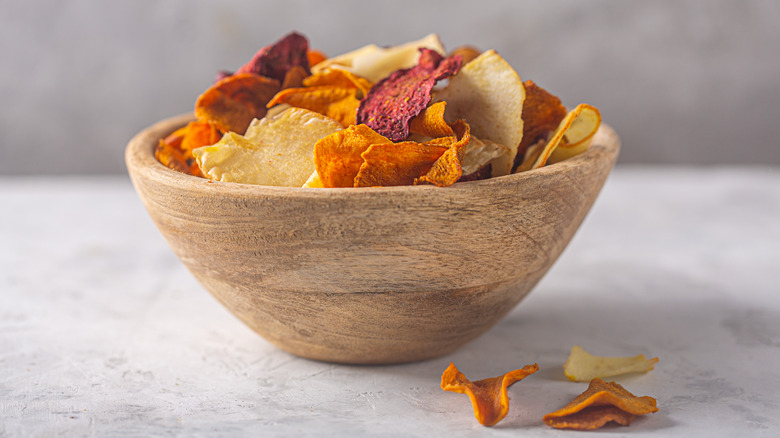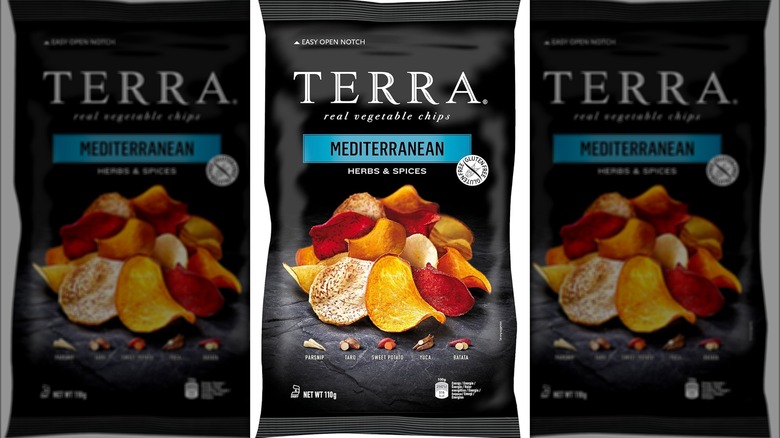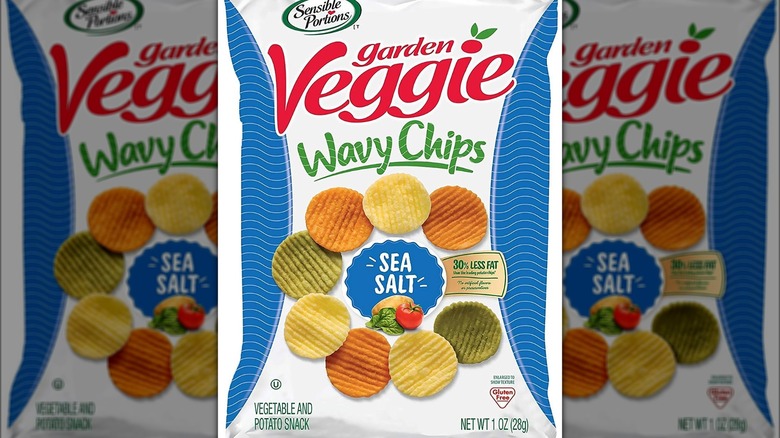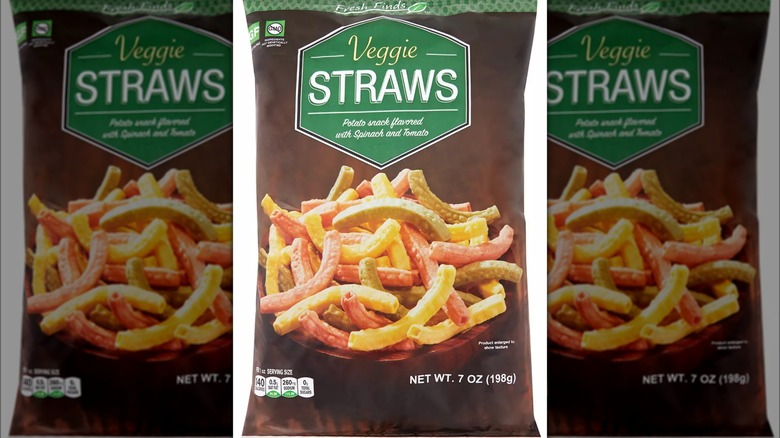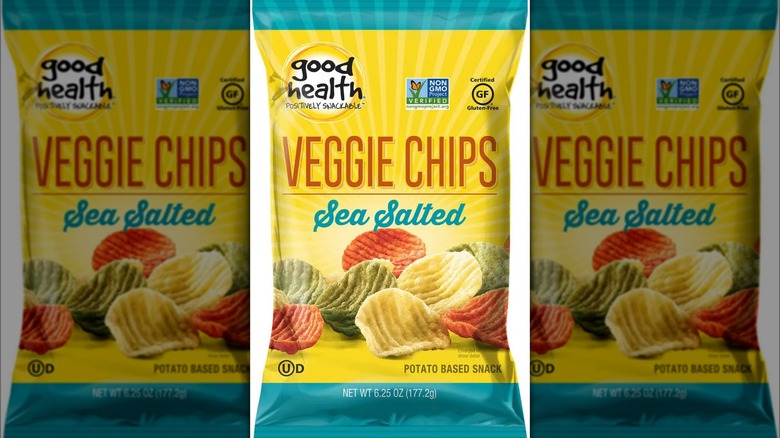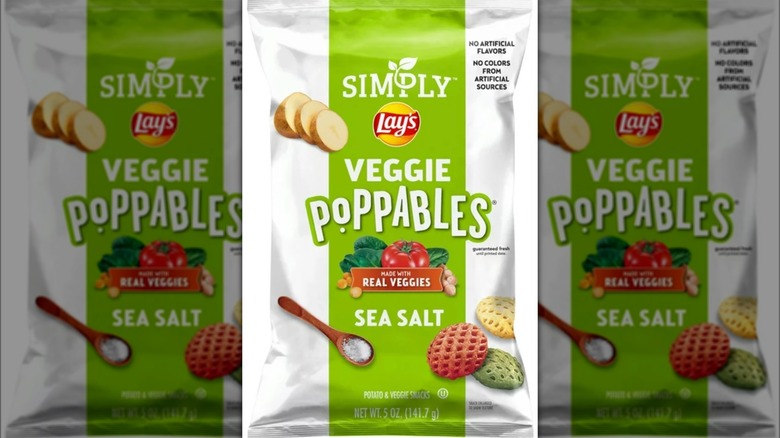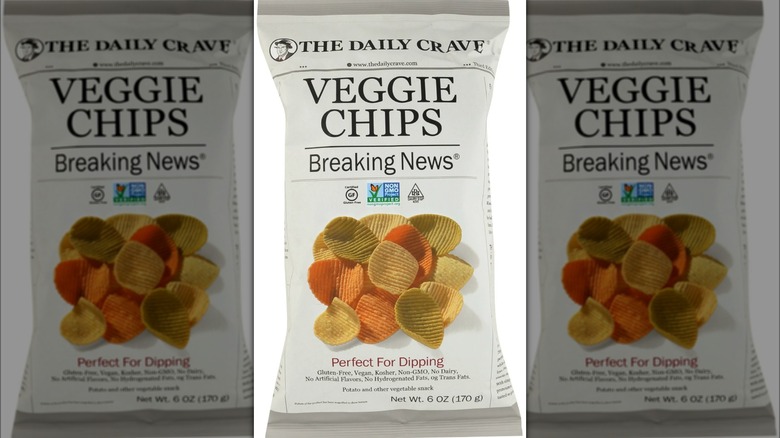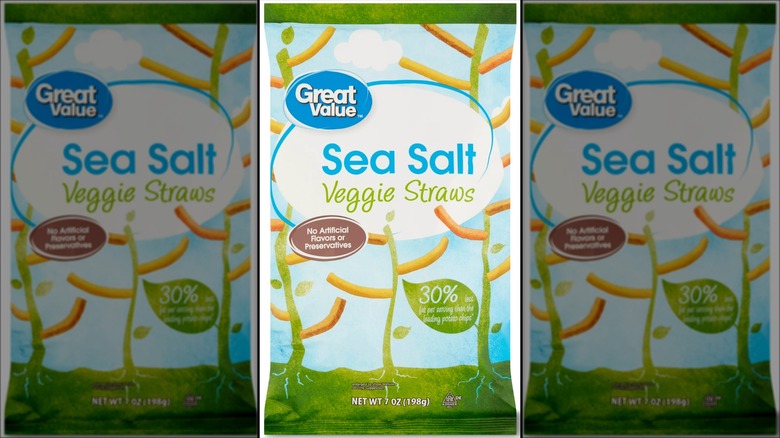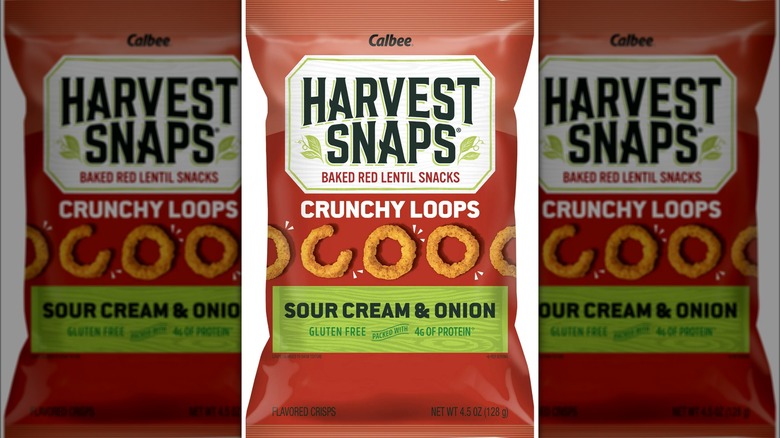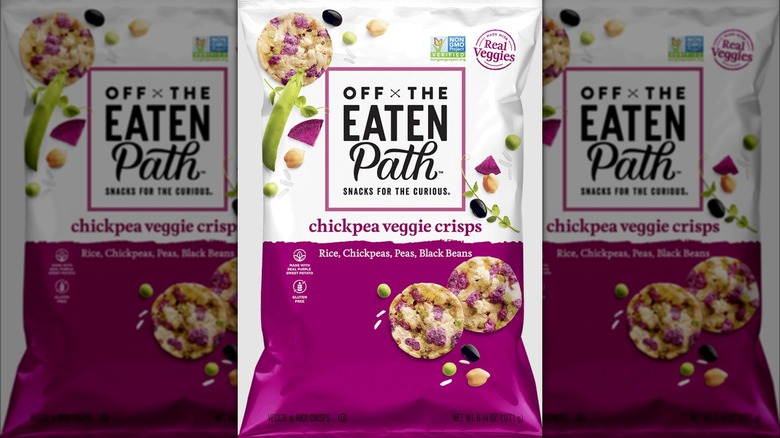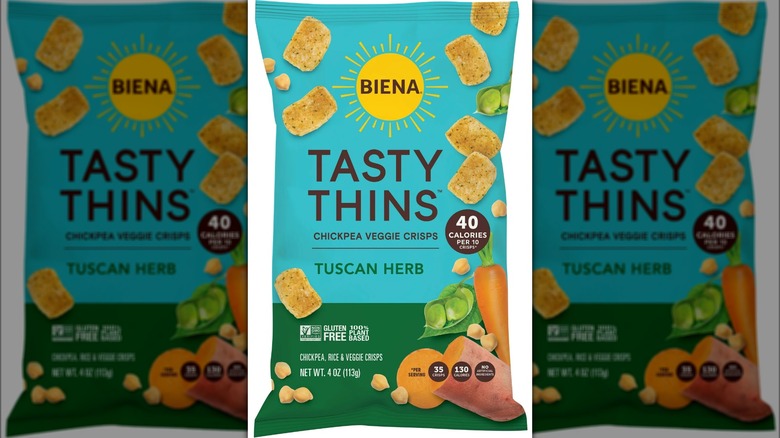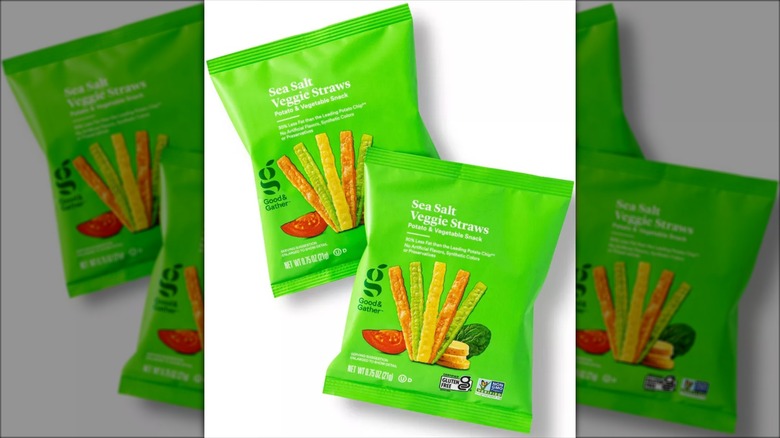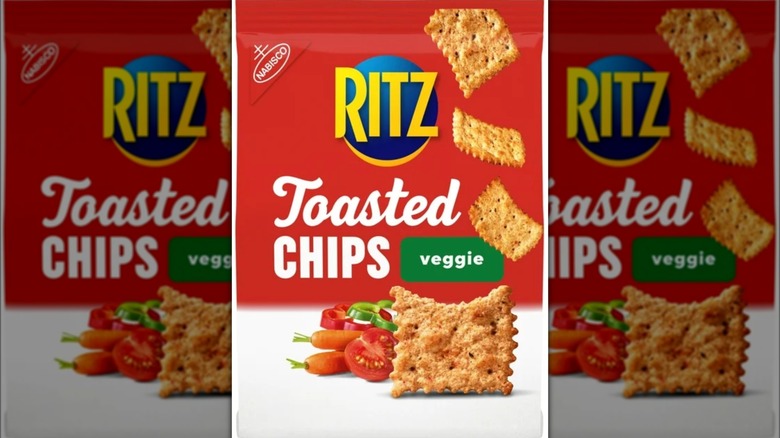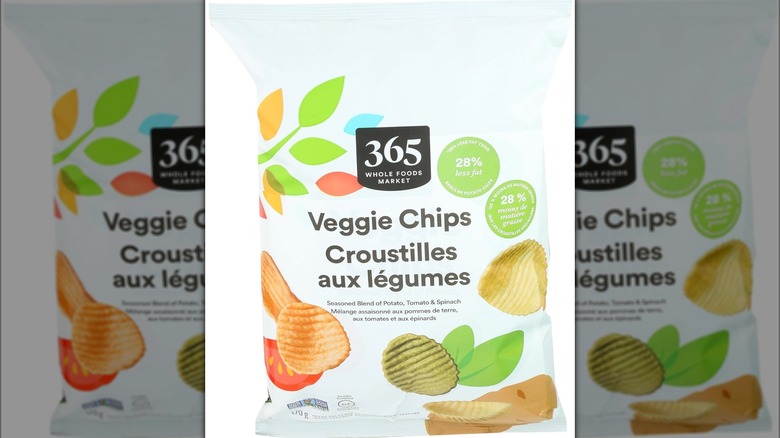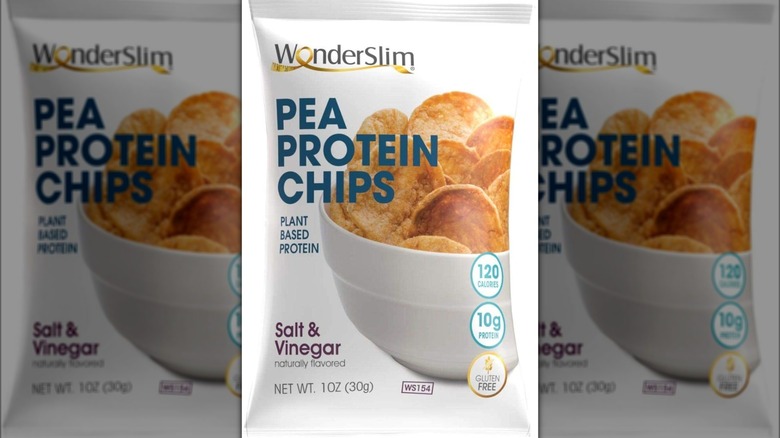14 Of The Unhealthiest Store-Bought Veggie Chips
While veggie chips are often branded as a wholesome alternative to potato chips (which are, if you think about it, a veggie chip themselves), they're generally prepared the same way: fried in oil, then coated in salty seasoning mixes. Some veggie chips go through an extra round of processing and are made from a composite of different flours, starches, and vegetable powders before being shaped into chip form. Veggie straws also go through the same process — and these additional ingredients and preparations mean they can be less nutritious than potato chips, with less sodium, fiber, and true vegetable content.
Salt tends to be the most concerning ingredient in veggie chips and straws, due to the sheer amount that often makes its way into these snacks. Some portions of veggie chips can have almost 15% of your daily value for sodium in just a few bites. In this article, we primarily looked at the sodium levels of various veggie chip brands to determine the unhealthiest options. We also included other nutritional factors, like saturated fat levels and low amounts of vitamins, minerals, fiber, and protein in our criteria. Let's dive into the unhealthiest store-bought veggie chips.
1. Terra Mediterranean Chips
Everything about Terra Mediterranean Chips seems to put them on the healthier side of things. Unlike some other types of veggie chips, which are comprised of a combo of starches and powders, Terra uses whole slices of root vegetables. This gives its Mediterranean Chips a slight boost of fiber in every bite, as well as a small, yet noticeable bump in vitamin and mineral content.
But the salt content lets the product down. There are 210 milligrams of sodium per bag of chips, enough to cover almost 10% of your daily value. These chips also have 13 grams of fat and 1.5 grams of saturated fat per serving, in a bag that weighs just 40 grams — meaning roughly a third is just fat.
While this sodium amount may seem small, it's a lot for a snack. Combine these with regular meals, and you could be pushing above your daily value. Consuming too much salt regularly can contribute to some serious health concerns, and raise your likelihood of high blood pressure, heart disease, stroke, and even disrupt your sleep. It's recommended that you consume no more than 2,300 milligrams per day. Skip these chips and microwave some homemade veggie chips in a flash, adding just a small amount of salt to give them a pop of flavor.
2. Garden Veggie Sea Salt Wavy Chips
Garden Veggie Sea Salt Wavy Chips are a great example of a veggie chip that seems healthy, but isn't. Rather than being mixed root veggie chips, these chips are made from an amalgamation of potato flour, potato starch, spinach and beetroot powder, and tomato paste, as well as sugar, fat, and salt. These concentrated ingredients are completely devoid of the fiber that was once in the original vegetables, which means these chips will undoubtedly leave you hungry. The fact that they have less than a single gram of protein doesn't help either. Both fiber and protein can help to regulate digestion and control hunger, but these chips will likely do no such thing.
The salt content, too, is not to be sniffed at. In every serving of Garden Veggie Sea Salt Wavy Chips, there are 230 milligrams of sodium, covering 10% of your daily value. Snacks are a common culprit of hidden salt sources, especially when they're processed and packaged, and it can be easy to consume them without checking their sodium content. Avoiding heavily processed foods and opting for specifically low-sodium snacks is a good way to keep your sodium content down.
3. Fresh Finds Veggie Straws
Fresh Finds Veggie Straws come in fairly muted shades of green and red, which seems to indicate the presence of some vegetable, somewhere. Indeed, these colors are provided by tomato, beet, and spinach powder. However, these powders don't seem to be doing much nutritionally. There are barely any vitamins or minerals in these veggie straws, with normally iron-rich spinach being almost totally stripped of its iron content, adding up to a total of 0.2 milligrams per serving here.
We're also pretty worried about the sodium levels in Fresh Finds Veggie Straws. Every serving has 250 milligrams of sodium, a higher-than-average amount that makes these straws not just salty, but way less nutritious. High levels of sodium are depressingly common in processed foods, where it's added both to boost flavor and to stabilize and preserve the product. Unfortunately, these higher quantities also make processed foods less good for you. Skip these straws if you're looking to stay healthy.
4. Good Health Sea Salt Veggie Chips
When a snack has "good health" and "veggie chips" in its name, you can be forgiven for assuming it's going to be wholesome. But Good Health Sea Salt Veggie Chips don't fulfill that promise. These snacks are, like so many other veggie chips, made from various powders and starches. Moreover, given that the primary two ingredients in them are "dehydrated potato" and "potato starch," they're essentially potato chips that have been more rigorously processed than normal.
That processing also means that they're flooded with sodium. With 290 milligrams of sodium per serving, these are one of the saltiest veggie chip options on the market. This amount covers 13% of your daily value of 2,300 milligrams. Regularly consuming more than this quantity can put you at greater risk of chronic health conditions. Unfortunately, these chips don't fare much better in other categories. Each serving has just one gram of fiber, which is less than the comparative serving sizes of some potato chips. They also contain less protein than potato chips, have more saturated fat, and are lower in essential minerals like calcium. So much for good health, right?
5. Simply Lay's Veggie Poppables
Lay's potato chips are everywhere, which means the brand has enough cash to test out other products. This, combined with the appeal of veggie chips, likely led to Simply Lay's Veggie Poppables. Everything about these chips seems more nutritious, from their bright colors (supplied by natural sources) to their simple green-and-white packaging.
Nutritionally, though, these chips are less than healthy. Each serving of Simply Lay's Veggie Poppables has 180 milligrams of sodium, 9 grams of fat, and 1 gram of saturated fat. The fat and saturated fat content is only slightly lower than what's found in a serving of Lay's Classic Potato Chips, which provides 10 grams and 1.5 grams respectively — and the veggie chips have more sodium in every bite than the regular potato variety. Additionally, Lay's Classic Potato Chips have more protein per serving than Simply Lay's Veggie Poppables, and a more nutritious vitamin and mineral profile; the Poppables have a mere 2% of your daily iron intake. We never thought we'd see a world where potato chips were more nutritious than veggie chips, but here we are.
6. The Daily Crave Veggie Chips
The Daily Crave Veggie Chips are quick to point out pretty much everything that's going right with them nutritionally. Take one look at the chips' simple packaging, and you're met with an array of pleasant-sounding features, like the fact that these chips are gluten-free, kosher, vegan, and have no artificial flavors or trans fats. Unfortunately, that's where the wholesomeness ends. These chips are also pretty salty, containing 180 milligrams of sodium, have virtually no vitamin or mineral content, and just 1 lonesome gram of protein.
While we're not crazy about the lack of nutrients, it's the salt content that we need to draw attention to here. While it's not the highest amount you can find in a pack of veggie chips, 180 milligrams is still a significant proportion of your daily value. Salt affects several bodily processes, but it's particularly impactful on the kidneys. When you consume too much salt regularly, it affects your body's sodium balance, thereby altering your kidneys' ability to remove water from the bloodstream. This means your kidneys have to work harder, which may result in kidney disease. These chips may be perfect for dipping into baba ghanoush, but they won't do your body any favors.
7. Great Value Sea Salt Veggie Straws
Walmart's Great Value range offers a huge variety of snack foods, including veggie straws. You shouldn't rely on them to be healthy, though. Great Value Sea Salt Veggie Straws are potato straws in everything but name, being made from potato starch and flour and given a barely-there pop of color with various vegetable powders. While potatoes are obviously vegetables, making the name of this product technically true, there's really no reason not to buy potato chips in the first place instead of these straws.
What's worse, these veggie straws have barely any nutrition in them. Each serving has a high 210 milligrams of sodium, almost 10% of your daily value. It also has 7 grams of fat, 1 gram of fiber, 1 gram of protein, and minuscule vitamin and mineral content. None of these nutritional factors are particularly great, but the salt content is especially troubling. Salt doesn't just impact the body — particularly the cardiovascular system — but the mind as well. A study published in Nature Neuroscience found that a high level of salt in the diet can alter blood flow to the brain, which can potentially lead to cognitive impairment.
8. Harvest Snaps Crunchy Loops Baked Red Lentil Snacks
As veggie snacks go, Harvest Snaps Crunchy Loops Baked Red Lentil Snacks aren't the worst — but they're not the best either. These snacks have the benefit of slightly higher protein content than most veggie chips, with 4 grams per serving, thanks to their red lentils (which, interestingly, cook faster than other varieties). They also deliver 2 grams of fiber in each 28-gram portion, and because they're baked, they have just 6 grams of fat.
They do, however, still have a fair amount of sodium in each bite. Every serving of Harvest Snaps Crunchy Loops Baked Red Lentil Snacks has 180 milligrams of sodium, delivering almost 10% of your daily value. Among its other potential risks, a diet high in sodium can be particularly impactful on your bone health. Higher salt intake can increase the risk of osteoporosis, due to its potential to prompt hypercalciuria. Hypercalciuria is a condition where the calcium levels in your urine are increased, which can lead to a decrease in calcium in your bones, and subsequent weakening.
9. Off The Eaten Path Chickpea Veggie Chips
Off The Eaten Path's veggie chips have a fair number of things going for them. The Chickpea Veggie Chips manage to pack some much-needed legumes into each bite, with dried black beans, green peas, and the increasingly popular purple sweet potato in every chip. This helps give them an impressive 4 grams of fiber in each serving and amps up their protein content to a whopping 5 grams per pack — not bad for a snack.
Unfortunately, these crisps suffer elsewhere on the nutrition front, most obviously because of their sodium content. Every pack of Off The Eaten Path Chickpea Veggie Chips has 190 milligrams of sodium. This level of sodium isn't uncommon in pulse-based snacks like this, and it can be a real problem. Pulse-based snacks like chickpea or lentil chips are often perceived as healthier than potato chips, which means people scrutinize them less carefully and fail to assess how salty they are. As a consequence, it's easy to end up eating a lot of this super-salty snack without even realizing it.
10. Biena Tasty Thins Tuscan Herb Flavor Snack Crisps
Chickpeas are a popular base for veggie chips; their inclusion can make the chips seem healthy. That's not quite the case with Biena Tasty Thins Tuscan Herb Flavor Snack Crisps, though. These chips are made from chickpea flour, which deliver slightly nuttier flavor, but are stripped of the majority of their natural fiber. As a result, these veggie chips have just 1 gram of fiber per serving, although the 3 grams of protein in each portion does make things look slightly better.
As with so many other veggie chips, it's the sodium content that lets this snack down. Biena Tasty Thins Tuscan Herb Flavor Snack Crisps have 230 milligrams of sodium in every serving, covering 10% of your daily value. Remember, too, that the 2,300mg daily value only applies to people over 14 years of age; kids who are younger than that should aim to eat less per day. Considering that more and more children are developing high blood pressure, helping them make healthy choices and manage their sodium intake has never been more important.
11. Good & Gather Sea Salt Veggie Straws
Target's Good & Gather range has all the food bases covered, including a generous selection of portable snacks. Its Sea Salt Veggie Straws are perfect for eating on the go, but they're less good for your health. These veggie straws are full of sodium, delivering 260 milligrams per 21-gram serving. When you consider that this portion size is significantly smaller than that of many other veggie straws and chips, which have lower sodium levels, it shows how much salt you're getting in each bite.
Good & Gather Sea Salt Veggie Straws are also fairly disappointing elsewhere. They have no fiber whatsoever and just 1 gram of protein — although they do have a slightly higher vitamin and mineral content than other veggie straws. Unfortunately, this relative lack of nutrition is a common issue with veggie straws. These snacks are often assumed to be (and marketed to seem) healthier, but because they're typically deep-fried and made up of reformed starches and flours, they have hardly any health benefits whatsoever.
12. Ritz Toasted Veggie Chips
Ritz crackers can be used in ways you never thought of, but what you may not realize is that Ritz has way more options beyond its standard product. One of them, Ritz Toasted Veggie Chips, sounds like a healthy option — but unfortunately, it isn't. Ritz Toasted Veggie Chips certainly look the part, with a rustic, rustled shape that indicates their whole-grain nature. They also have 2 grams of fiber and protein each, making them slightly more nutritious on those fronts than a lot of other veggie chips out there.
It's when you look at the salt and sugar content that things start to go wrong. Ritz Toasted Veggie Chips have 250 milligrams of sodium per serving and a significant 3 grams of added sugar. These added sugars are pretty unusual when it comes to veggie chips, making Ritz an outlier. The combination of salt and added sugar can have a double-punch effect on your health. Both of these nutrients can increase the likelihood of inflammation, which can then raise the risk of various chronic diseases, including cancers, according to research published in the Indian Journal of Endocrinology and Metabolism. Attempting to reduce both nutrients in your diet is important, making the notable presence of both in these chips fairly unwelcome.
13. 365 Veggie Chips
Whole Foods' 365 range offers its own version of veggie chips, delivering premium crunch at a great price. The nutritional content of this snack, however, is less appealing. 365 Veggie Chips proclaim that they're made from potato, tomato, and spinach, but that's slightly misleading: All of the vegetables in the product are supplied by powders or flakes, not whole produce. Moreover, the chips have a fairly high sodium content, with 190 milligrams per serving.
This is extra notable considering the snack's low protein and fiber content. There's under 1 gram of each in every serving of these chips, meaning they're going to leave you pretty hungry. High-sodium, low-fiber foods are especially worrying, as fiber can help to reduce the impact of salt consumption. There's also the fact that these chips are coming from Whole Foods Market, a store that has long touted its organic credentials. You might feasibly expect the brand to produce food that's a little more nutritious than this.
14. WonderSlim Pea Protein Snack Chips
Protein-rich snacks are all the rage and frequently used to top up protein intake and stave off hunger. So, at first glance, WonderSlim Pea Protein Snack Chips may look pretty tempting. These chips offer a whopping 10 grams of protein in every portion, way more than most other veggie chips. Even though they don't have any fiber in them to speak of, they're also pretty impressive on the fat front, with just 4 grams per serving and no saturated fat at all.
It's when you look at the sodium content that things start to go wrong. Each serving of WonderSlim Pea Protein Snack Chips has 330 milligrams of sodium, the highest amount of any veggie chips we've encountered. That covers almost 15% of your daily value in a mere 30 grams of chips. Pea protein's sodium content is often surprisingly high, due to the use of salt solutions in its extraction process; the leftover sodium makes its way into the products made with it. It's worth considering whether you can get your protein boost from other dietary sources that may not be so sodium-rich.
